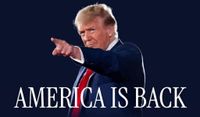On April 3, 2025, the cryptocurrency market faced a significant downturn following the Trump administration's announcement of a "tariff bomb" aimed at various countries. Bitcoin and Ethereum, two of the most prominent digital currencies, experienced notable declines as investor sentiment shifted in response to the news.
As of 8:40 AM KST on April 3, Bitcoin was trading at 121,070,000 KRW, reflecting a 3.58% decrease from the previous day. Compared to the price just before the tariffs were announced at 5 AM KST, Bitcoin had dropped by 6.59%. Meanwhile, Ethereum and Ripple (XRP) saw even steeper declines of 8.62% and 10.67%, respectively, according to data from CoinBase.
President Donald Trump unveiled his plan for reciprocal tariffs during a speech in the White House Rose Garden on April 2, 2025, stating that the U.S. has been subjected to unfair trade practices for decades. He criticized other nations for imposing high tariffs and non-tariff barriers on American products and declared, "April 2 will be remembered as the day we began to make America wealthy again."
The proposed tariffs include a base rate of 10% on all imports, with additional punitive tariffs targeting about 60 countries deemed as the worst trade offenders. Specific tariff rates include 34% for China, 20% for the EU, 46% for Vietnam, 32% for Taiwan, 24% for Japan, and 26% for India. South Korea, in particular, will face a reciprocal tariff rate of 25% on products exported to the U.S.
Following the announcement, the cryptocurrency market reacted sharply. Bitcoin, for instance, fell from approximately $88,000 to about $82,941 shortly after the news broke, marking a rapid decline of nearly 6%. Other major cryptocurrencies, including Ethereum and Solana, also experienced drops in the range of 5-6%, leading to widespread turmoil across the market.
The total market capitalization of cryptocurrencies decreased by about 5% in the wake of the tariff announcement. The Fear-Greed Index, which measures investor sentiment in the cryptocurrency market, plummeted to 17 points, indicating a state of "extreme fear." This drop in sentiment reflects the growing apprehension among investors regarding the impact of increased tariffs on the economy and the cryptocurrency market.
Industry insiders have expressed concerns that Trump's tariff policies will place significant pressure on the cryptocurrency market. One industry expert noted that deteriorating global trade conditions could raise fears of an economic slowdown, prompting investors to seek refuge in safer assets. Furthermore, high tariffs might lead to increased inflationary pressures, potentially resulting in central banks raising interest rates, which could negatively affect non-productive assets such as cryptocurrencies.
Despite the initial drop in prices, some analysts believe that the decline in Bitcoin's value may be temporary. According to CoinGecko, there is potential for a rebound in Bitcoin prices based on the underlying fundamentals that have been established in the market. This perspective suggests that, while the immediate impact of the tariffs is negative, the long-term outlook for Bitcoin could stabilize as conditions evolve.
As the cryptocurrency market grapples with the ramifications of Trump's tariff announcement, investors remain cautious. The overall sentiment is one of uncertainty, with many watching closely to see how these new tariffs will affect not only the cryptocurrency market but also the broader economic landscape.
In the wake of the tariff announcement, the U.S. stock market had previously shown strength, buoyed by hopes of resolving uncertainties. However, after Trump’s speech, major U.S. futures indices experienced declines, mirroring the downturn in the cryptocurrency market.
As the situation develops, analysts and investors alike will be keen to monitor the effects of these tariffs on trade relations and market dynamics. The cryptocurrency sector, often seen as a barometer for broader economic confidence, will likely continue to reflect the anxieties surrounding global trade and economic stability.
The announcement of these tariffs has not only sent shockwaves through the cryptocurrency market but also raised questions about the future of international trade under the Trump administration. With various countries facing steep tariffs, the potential for retaliatory measures looms large, further complicating an already volatile economic environment.
In conclusion, the cryptocurrency market's reaction to the Trump administration's tariff bomb highlights the interconnectedness of global trade policies and digital assets. As investors navigate this challenging landscape, the implications for both the economy and the cryptocurrency market will be closely watched in the coming weeks.




![전 세계 덮친 美 '상호관세' 공포…비트코인 8만2000달러 '뚝'[코인브리핑] : 네이트 뉴스](https://thumbor.evrimagaci.org/cIf7nraUSDlo06ucac2468Zbe8Q=/200x0/tpg%2Fsources%2Fcacb999b-0cd5-44cd-9928-cf2ecdeeb56c.jpeg)
